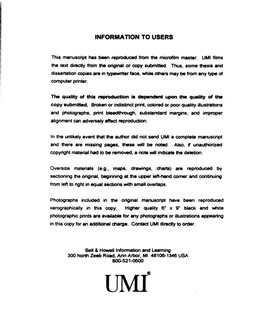| dc.contributor.advisor | Siverson, Gerald, | en_US |
| dc.contributor.advisor | Nelson, Joy, | en_US |
| dc.contributor.author | Hall, Jennifer Loie Pray. | en_US |
| dc.date.accessioned | 2013-08-16T12:30:54Z | |
| dc.date.available | 2013-08-16T12:30:54Z | |
| dc.date.issued | 2000 | en_US |
| dc.identifier.uri | https://hdl.handle.net/11244/5963 | |
| dc.description.abstract | INTERNATIONAL MUSIC CAMP "success" was defined in terms of consistent or increasing enrollment, staff and student retention, protean, qualified artist/teachers and staff, motivated students, North Dakota and Manitoba student constituencies, international student attendance, an inclusive admittance policy, high artistic and behavioral expectations, international reputation, affordability, unique location, and aggressive off-season promotions. | en_US |
| dc.description.abstract | The following research issues were considered throughout the investigation as they applied to the INTERNATIONAL MUSIC CAMP: (1) why was the IMC successful from its inception, (2) what contributed to its forty-four-year success, (3) how is success defined, and (4) how to ensure its future success. | en_US |
| dc.description.abstract | Extensive involvement in IMC activities and successful music education experiences as North Dakotans provided the ideal background for Joseph and Joyce Alme to assume leadership of the IMC from 1983 through the present. Future success of the INTERNATIONAL MUSIC CAMP is dependent upon preserving the qualities of success previously defined, and maintaining a flexibility that meets the changing needs of its constituency. | en_US |
| dc.description.abstract | The purpose of this study was to investigate factors contributing to the growth and success of the INTERNATIONAL MUSIC CAMP (IMC) by constructing a chronological record of its development and interviewing credible participants concerning IMC procedures. Data were collected using the focused interview technique, correspondence with camp affiliates, executive board minutes, camp brochures, IMC annual newsletters, and the annual collection of comprehensive materials detailing all camp activities from 1956 until 1999. These records included student enrollment, curriculum offerings, schedules, personnel lists, guest conductors, performance programs, weekly student attendance, course enrollments, gender data, retention figures, geographical constituency, scholarship and award recipients, and private lesson rosters | en_US |
| dc.description.abstract | The passionate leadership of Merton and Noella Utgaard, equally dedicated colleagues, the location of the camp in the international Peace Garden, Utgaard's distinctive background including Boy Scout activities, early musical training in rural North Dakota, military service and worldwide networking, contributed to his unique approach in developing the camp and its, facilities from its inception in 1956 until his retirement in 1983. | en_US |
| dc.format.extent | xiv, 407 leaves : | en_US |
| dc.subject | Education, Music. | en_US |
| dc.subject | Fine Arts. | en_US |
| dc.subject | Music camps History and criticism. | en_US |
| dc.title | The International Music Camp: Model band camp from an historical perspective. | en_US |
| dc.type | Thesis | en_US |
| dc.thesis.degree | Ph.D. | en_US |
| dc.thesis.degreeDiscipline | School of Music | en_US |
| dc.note | Source: Dissertation Abstracts International, Volume: 61-04, Section: A, page: 1334. | en_US |
| dc.note | Major Professors: Gerald Siverson; Joy Nelson. | en_US |
| ou.identifier | (UMI)AAI9968100 | en_US |
| ou.group | Weitzenhoffer Family College of Fine Arts::School of Music | |
